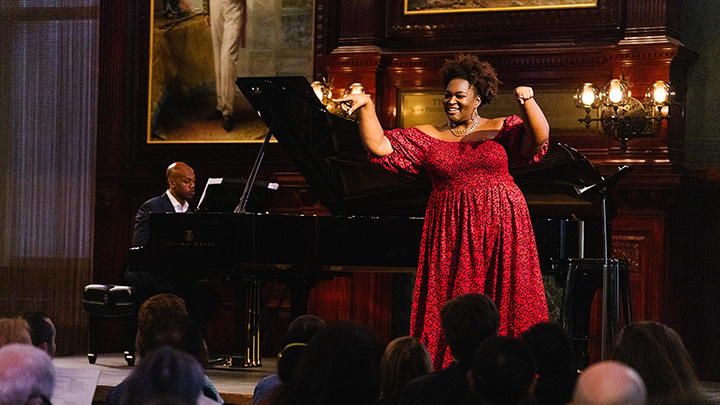The soprano, then a member of the Lindemann Young Artist Development Program, garnered a rapturous response from critics and audiences for her brief appearance. At the performance I attended, the quality of her sound was as tantalizing as the berries she peddled to the residents of Catfish Row. The Family Circle was enthralled. Since then, Hawkins has made several prominent appearances at the Met, including a dual role in last season’s X: The Life and Time of Malcolm X. She is, however, conspicuously absent from this season’s lineup.
No matter. If Hawkins proved anything at her recital last Friday, it is that her charisma and self-assuredness can amplify any venue, even one as intimate as the Park Avenue Armory’s Board of Officers Room.
Joined by accompanist Kevin Miller, Hawkins put together an evening of song that served as a rebuke of the labels and expectations that Black artists face. The program, entitled “C’est ainsi que tu es” (That Is How You Are) from the Poulenc song of the same name, moved fluidly from early 20th-century French art songs to contemporary compositions and arrangements by Black American and Caribbean composers. An assured rendition of Doris Aker’s gospel standard “Sweet, Sweet Spirit” opened the program. Hawkins smartly blended her classical approach with more idiomatic melismata, and Miller’s gentle accompaniment warded off any saccharinity. They suffused the space with a warmth that invited the audience in. She then read an excerpt from her program notes explaining the personal nature of her repertory choices over the opening bars of the titular song. It was clear that this evening was not an artist’s sublimation of the self in service of the music, but an exploration of how music can elucidate and complicate our senses of self. And the Poulenc, in which Hawkins’s ruby port soprano caressed the unspooling elegance of the melodic line, was gorgeous.
Five selections from Clairières dans le ciel, the only song cycle of Lili Boulanger, followed. In the tradition of Die schöne Müllerin, the cycle recounts thwarted love amid a rustic landscape. In keeping with Boulanger’s association with the Symbolist movement, it traces the inward movements and vagaries of memory rather than a conventional narrative arc. The first two songs, “Elle était descendue au bas de la prairie” and “Elle est gravement gaie,” felt decidedly earthbound because of some labored tempos from both the singer and accompanist. In the later selections, however, Hawkin’s approach to the rhythmic challenges of Boulanger’s vocal writing became nimbler, and she plumbed the contrast between the misty resonance of her chest voice and the lucid qualities of her upper register.
“Nous nous aimerons tant,” the concluding selection from the cycle, was perhaps the strongest moment of the evening. Here, Boulanger employs a simple melody that slowly ascends the scale, only briefly flirting with its upper end, and at points calls for the piece to be delivered sans nuances. Hawkins honored the composer’s request while infusing throbbing tension beneath each of the notes, her voice never rising above piano. In an effective bit of staging, she turned her body in towards the crook of the piano and gazed into the distance to convey the text’s deep nostalgia. This contrasted with the proceeding pieces, where she was quite animated and engaged directly with the audience. It was an excellent example of Hawkin’s willingness to employ gesture and movement to shape space to maximize the impact of her delivery. She took full advantage of her instrument—body and voice—and asserted her presence fully.
The open chords of the Boulanger made way for the melancholic strains of “Nature Body” by eden abhez, presented here in a jazz-tinged arrangement by baritone and composer Jorell Williams. Yet, Hawkins drew a connection between the pieces as she sang much of the piece sans nuances and in straight tone, adding an ethereal quality to the melody without denying its earnestness. She then returned to Poulenc with the beloved “Les Chemins de l’amour.” She approached the first verse with a knowing playfulness, adding a flick of the wrist here and there and swaying along to the waltz rhythms. By the middle verse, she and Miller slowed their tempo significantly, allowing her to elongate the melody and coax its full sensuousness. A ravishing pianissimo brought the first half of the program to its conclusion.
Hawkins and Miller returned with Williams’s moody vocalise “Blue Lullaby.” Though not harmonically memorable, the piece’s exposed passages gave the audience ample opportunity to appreciate Hawkins’s supple middle register. (The agitated textures of the earlier “Runaway” for Miller on solo piano made a more convincing case for Williams as a composer). Next came Taubenlieder by Joel Thompson with text taken from the poetry of former U.S. Poet Laureate Rita Dove. Much like Boulanger, Thompson, the current composer-in-residence at the Houston Grand Opera and the author of several excellent pieces for solo voice, has crafted a cycle concerned with memory: the narrator’s Proustian encounter with a scarf brings a recollection of things lost and moments past. This cycle, however, ends not with a lament but with an affirmative cry to “shake a leg” and face the future. With its blend of crashing chords and roiling accompaniment, the cycle allowed Hawkins her fair share of Diva moments and unfettered emotionality, as the arching vocal lines called upon her instrument’s full expansion.
The program then turned from poetry to Proverbs, Jasmine Barnes’s settings of three sayings of Zimbabwean, Hausa, Yoruba, and Swahili origin. The first two pieces were short and straightforward in keeping with their didactic subjects, with “The Tree” taking on a slight gospel tinge. “Hurry Hurry,” an African telling of the Tortoise and the Hare, called upon the audience to take part in a call and response in the final verse, further gesturing towards both African and Black American musical forms. Hawkins relished cajoling us to at least attempt to match her enthusiasm. Her feisty, comical delivery of the Jamaican folk song “Nobody’s Business,” in an arrangement by Peter Ashbourne, similarly charmed. She concluded the piece, and the program, with a liberated squeal of joy.
The recital was recorded for future broadcast and streaming on WQXR. I am sure Hawkins’s considerable presence as an artist will carry over the airwaves.
Photo: Da Ping Luo




